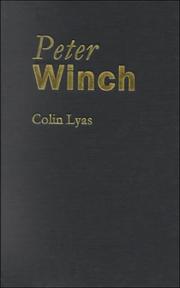| Listing 1 - 10 of 156 | << page >> |
Sort by
|
Book
ISBN: 9781681372204 Year: 2018 Publisher: New York New York review of books
Abstract | Keywords | Export | Availability | Bookmark
 Loading...
Loading...Choose an application
- Reference Manager
- EndNote
- RefWorks (Direct export to RefWorks)
Book
ISBN: 1139149555 1108040659 Year: 2013 Publisher: Cambridge : Cambridge University Press,
Abstract | Keywords | Export | Availability | Bookmark
 Loading...
Loading...Choose an application
- Reference Manager
- EndNote
- RefWorks (Direct export to RefWorks)
Francis Bacon (1561-1626), the English philosopher, statesman and jurist, is best known for developing the empiricist method which forms the basis of modern science. Bacon's writings concentrated on philosophy and judicial reform. His most significant work is the Instauratio Magna comprising two parts - The Advancement of Learning and the Novum Organum. The first part is noteworthy as the first major philosophical work published in English (1605). James Spedding (1808-81) and his co-editors arranged this fourteen-volume edition, published in London between 1857 and 1874, not in chronological order but by subject matter, so that different volumes would appeal to different audiences. Volume 2, published in 1857, continues part 1 of Bacon's Latin writings intended to be included as part of the Instauratio Magna.
Book
ISBN: 1139149547 1108040640 Year: 2013 Publisher: Cambridge : Cambridge University Press,
Abstract | Keywords | Export | Availability | Bookmark
 Loading...
Loading...Choose an application
- Reference Manager
- EndNote
- RefWorks (Direct export to RefWorks)
Francis Bacon (1561-1626), the English philosopher, statesman and jurist, is best known for developing the empiricist method which forms the basis of modern science. Bacon's writings concentrated on philosophy and judicial reform. His most significant work is the Instauratio Magna comprising two parts - The Advancement of Learning and the Novum Organum. The first part is noteworthy as the first major philosophical work published in English (1605). James Spedding (1808-81) and his co-editors arranged this fourteen-volume edition, published in London between 1857 and 1874, not in chronological order but by subject matter, so that different volumes would appeal to different audiences. Volume 1, published 1857, contains the biography by Bacon's secretary, William Rawley (c.1588-1667), and part 1 of the philosophical works included in the Instauratio Magna.
Book
ISBN: 8815080961 8815080988 9788815080967 9788815080981 Year: 2001 Publisher: Bologna : Il Mulino,
Abstract | Keywords | Export | Availability | Bookmark
 Loading...
Loading...Choose an application
- Reference Manager
- EndNote
- RefWorks (Direct export to RefWorks)
Book
ISBN: 1139136658 110804039X Year: 1876 Publisher: Place of publication not identified : Cambridge : publisher not identified, Cambridge University Press
Abstract | Keywords | Export | Availability | Bookmark
 Loading...
Loading...Choose an application
- Reference Manager
- EndNote
- RefWorks (Direct export to RefWorks)
Leslie Stephen (1832-1904) was a writer, philosopher and literary critic whose work was published widely in the nineteenth century. As a young man Stephen was ordained deacon, but he later became agnostic and much of his work reflects his interest in challenging popular religion. This two-volume work, first published in 1876, is no exception: it focuses on the eighteenth-century deist controversy and its effects, as well as the reactions to what Stephen saw as a revolution in thought. Comprehensive and full of detailed analysis, this is an important work in the history of ideas. Volume 1 contains a thorough discussion of the arguments for and against deism. The debate is placed in a wider philosophical context and the works of Descartes, Locke and Hume are all discussed in detail. The volume concludes with an examination of theological thought at the end of the century.
Book
ISBN: 9780415485494 9780203875308 Year: 2009 Publisher: London : Routledge,
Abstract | Keywords | Export | Availability | Bookmark
 Loading...
Loading...Choose an application
- Reference Manager
- EndNote
- RefWorks (Direct export to RefWorks)
Book
Year: 1961 Publisher: Garden City (N.Y.): Doubleday,
Abstract | Keywords | Export | Availability | Bookmark
 Loading...
Loading...Choose an application
- Reference Manager
- EndNote
- RefWorks (Direct export to RefWorks)
Book
Abstract | Keywords | Export | Availability | Bookmark
 Loading...
Loading...Choose an application
- Reference Manager
- EndNote
- RefWorks (Direct export to RefWorks)
Book
Year: 2002 Publisher: Detroit : Cengage Gale,
Abstract | Keywords | Export | Availability | Bookmark
 Loading...
Loading...Choose an application
- Reference Manager
- EndNote
- RefWorks (Direct export to RefWorks)

ISBN: 1317490274 1317490282 1315710889 128253470X 9786612534706 184465320X 9781844653201 9781317490289 1902683013 9781902683010 1902683021 9781902683027 Year: 1999 Publisher: Teddington Acumen
Abstract | Keywords | Export | Availability | Bookmark
 Loading...
Loading...Choose an application
- Reference Manager
- EndNote
- RefWorks (Direct export to RefWorks)
This is the first introduction to the ideas of the British philosopher, Peter Winch (192697). Although author of the hugely influential The Idea of a Social Science (1958) much of Winch's other work has been neglected as philosophical fashions have changed. Recently, however, philosophers are again seeing the importance of Winch's ideas and their relevance to current philosophical concerns. In charting the development of Winch's ideas Lyas engages with many of the major preoccupations of philosophy of the past forty years. The range of Winch's ideas becomes apparent and his importance clearly underlined. Lyas offers more than an assessment of the work of one man: it introduces in a sympathetic and judicious way a powerful representative of an important and demanding conception of philosophy.
| Listing 1 - 10 of 156 | << page >> |
Sort by
|

 Search
Search Feedback
Feedback About UniCat
About UniCat  Help
Help News
News